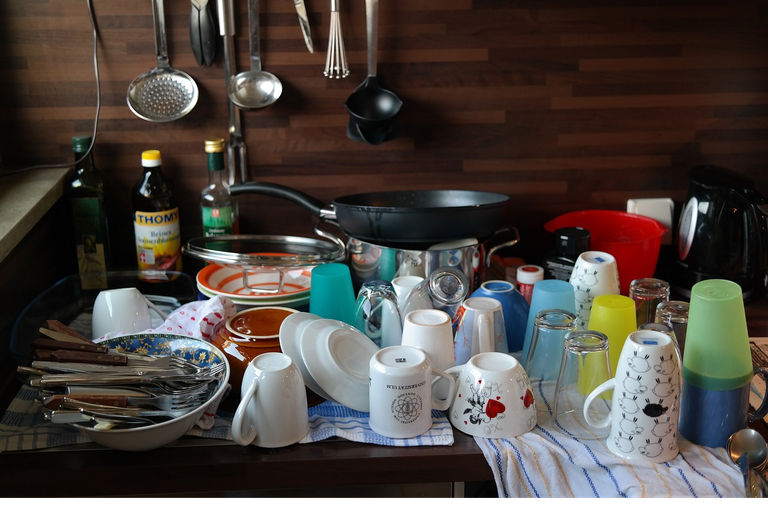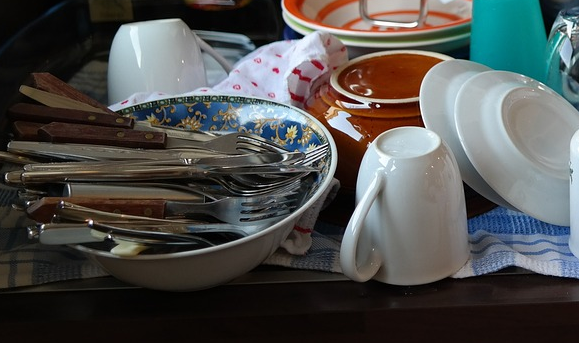
Pixabay
Mum's monologues
When I was eleven years old, I liked to imagine that there were homes in which what I will tell you about below did not happen.
t all started with an increase in the everyday noises in the house. It could be the sounds of the kitchen utensils, with the metallic clanging of pots and pans, metal kitchen containers and cutlery, began to reach all areas with unusual clarity. That the sticks of cleaning implements, brooms, mops and dustpans, normally silent, acquired an almost speaking condition that joined the heavy sound of the dragging of buckets full of water for the mopping of the floors. It could also be that the sound of knives clattering over vegetables denoted an accelerated rhythm in the kitchen.
Other things could happen. Contrary things: that there was an eerie silence, that the radio stopped playing, with its endless parade of romantic songs, or, even worse, that the children in the house realised that mum wasn't singing that day.
There were six of us children scattered around the house. The younger ones were always very close to mum's lap. The older ones, including me, were hard at work constructing their own imaginary world. The exaggerated clattering of the dishes or the marked silence reached us wherever we were.
I knew, then, that mum's monologues were coming.
Mum began by saying that she didn't understand how it was possible that she alone could see everything there was to do, every day, in that house.
"Only I have eyes?
She would then begin to list all the household chores.
"Everyone knows that the front of the house has to be swept, the furniture has to be shaken, the rooms have to be tidied, the bushes have to be watered, the courtyard has to be cleaned..."
In this way she would detail, always in a precise order, a spatial order, from the front door of the street to the last corner of the courtyard, all the types of cleaning work that are necessary to every part of the houses.
In a literary sense, what mother reproduced from time to time was a monologue, an exposition of all women's work in the key of anger.
Mother's monologues always began in the same way: A spatial enumeration, by type of work, in an angry tone and with overwhelming speed.
Thinking about it, I have to say that the audience to whom the monologue was dedicated were the older females in my family. My younger sister was not part of that audience because she was too young. Therefore the content of the discurse was addressed to me, mainly because I was the eldest, and secondly to my sister, who was one year and nine months younger than me. My male siblings, for cultural reasons, were excluded from household chores, so they understood that these words were not addressed to them.
My sister and I would leave our positions when mum's claims began. We stood at a safe distance from our mother and quietly asked how we could help her. We knew in advance what jobs we would be assigned to do, but we didn't dare, in that atmosphere, to take any initiative.
My mother's way of responding to us in such circumstances was to start a new discourse. This time, detailing the jobs she had already done.
For example, she might say:
""I've already swept the floor, I've mopped it, I've polished it, I've cleaned the window frames and glass, I've vacuumed the furniture, I've removed the cobwebs..." mum could perfectly well have said that she had tidied the living room, but, no, she needed to emphasize every action.
I knew her monologue by heart. I knew my mum was angry and that annoyed me a lot but I must also say that I looked forward, with a kind of hidden, mischievous joy, to the part where she specified her work in the sink.
I've already washed the spoons, the teaspoons, the forks, the knives, the cups, the glasses, the jugs, the bowls, the soup plates, the dinner plates, the frying pans, the pots, all the lids...".
Omitting mother's annoyance, that moment was, for me, delightful. Mom would go over the whole house, all our belongings, our rooms with her words. I could mentally pass from one place to another without having to move, and I could always imagine a before and an after in relation to mum's work.
At that time the word stress was not colloquially used.
Today I can understand that on those days when mum succumbed to fatigue - and certainly to other "adult factors" - she used her monologues as a means of venting. I am so grateful that she was able to deal with her disagreements with what I have called here "her monologues". Thanks to them, through her own words, my mother received relief and help that would not have come naturally.
She also received a kind of consideration in keeping order in the house.
On the evenings of the days of the monologues my house was sparkling from end to end and mother seemed happier than ever.'
I begin to wonder: Is it only me who has eyes in my face? Does no one else look at the mess?
When I start to do the chores and look around I feel that inside me some ideas are being organised very similar to those in my mother's monologues.
Sometimes I smile and calm down. Sometimes I don't. Then I let out my own lonely words, my complaints, my scoldings, my pent-up rages.
Thank you for reading

@gracielaacevedo



